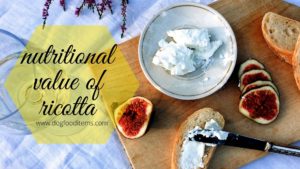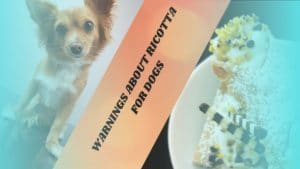Can dogs eat ricotta? The cheese lover always asks a question that can my dog eat cheese? And recently heard a question about ricotta cheese, that can my dog eat ricotta cheese?
So, the most satisfactory answer is YES! The dog can eat ricotta. But always keep the dose in moderation because it is high in fat. So, it is not harmful to dogs but high in fat and can cause the dog’s weight gain.
What is ricotta?
The word ricotta is an Italian word that is translated in English as fluffy cheese clouds. And simply, the word ricotta meant recooked.
The ricotta cheese is technically made from the milk of sheep, cows, or goats. But ricotta we frequently buy is made with cow’s milk.
The ricotta can be called the cheese byproduct. So, the ricotta is made by reheating the leftover of other types of cheeses.
The ricotta was originated in Italy. And it was made with the milk whey of dairy animals. The ricotta is inexpensive and widely available.
The ricotta is very grainy, thick sour cream in texture. And it is very healthy and nutritious for both humans and dogs.
Nutritional value of ricotta
The ricotta is the product of milk, and it is the leftover of the cheese. So, the ricotta is very rich in nutrients, and it is perfectly safe for humans and dogs, too but in moderation. As there are 147 calories present in the 100 grams of the ricotta. The nutritional value of 100 grams of ricotta is as follows
| NUTRIENTS | AMOUNT IN GRAMS | % age daily value |
| Total fat | 13 g | 20 % |
| Cholesterol | 51 mg | 17% |
| Sodium | 84 mg | 3% |
| Potassium | 105 mg | 3% |
| Total carbohydrates | 3 g | 1% |
| Dietary fibers | 0 g | 0% |
| Proteins | 11 g | 22% |
| Vitamin A | 8% | |
| Vitamin C | 0% | |
| Calcium | 20% | |
| Iron | 2% | |
| Vitamin D | 2% | |
| Vitamin B-6 | 0% | |
| Cobalamin | 5% | |
| Magnesium | 2% |
Benefits of ricotta to dogs
The ricotta contains a lot of nutrients that are beneficial for the dog. It is rich in protein and calcium content and comparatively low in sodium content. This balanced combination makes it safe and good for the dog’s health.
Warnings about ricotta
- Ricotta is safe for dogs but always keep the amount in moderation.
- The high-fat content in ricotta makes it unfit for the dog suffering from weight gain.
- The sugar content is also present in the ricotta, and this is also not good for the dogs when given in excessive amounts.
- Some dogs are lactose-in-tolerant; they cannot manage anything made with milk. You should avoid giving this ricotta or anything made with milk to them.
- If you give milk made with milk, then your dog can suffer from gas, diarrhea, and bloating.
- The long-term and excessive use of ricotta can lead to obesity in your dog.
- So, you should make your dog involved in different physical activities so that the fat can not deposit in the dog’s tissues.
FAQs
Can a dog have ricotta?
Yes, indeed, your dog can have ricotta but always keep the amount in moderation. Because the fat content in ricotta is considerably high and this can cause obesity in your dog.
Can dogs eat ricotta pasta?
Pasta is safe for dogs but is not considered perfect for dogs as it is rich in carbohydrate content. And in the case of ricotta pasta, the ricotta cheese is present, which not harmful for dogs. But it adds the fat content to the dish. So, in moderation, your dog can eat ricotta pasta. And if the amount increases, then this can lead to obesity in your dog.
Conclusion
The ricotta is safe for the dogs. And you can give the ricotta and dishes made with ricotta cheese to your dog. But always keep the amount in moderation. Because the ricotta is rich in fat, although all types of cheeses are fattening, we explicitly talk about ricotta.
So, You should avoid giving the ricotta to your dog regularly. If your dog gets bored with the typical food made for the dog regularly, then yes, occasionally, you can give it to your dog as a treat for the dog. This will make your dog feel happy.
And by closing it, I want to say that you should first consult the vet before giving anything for the first time to your dog. Because the effect of food can change according to the physiology and breed of the dog.


Leave a Reply